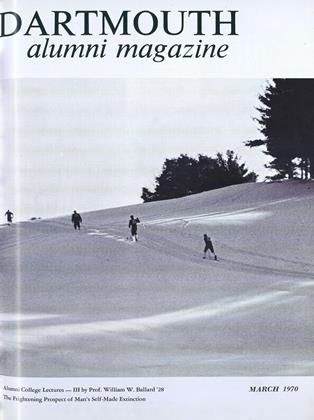Foreign policy experts from government and educational institutions will participate April 16-18 in the sixth annual Orvil E. Dryfoos Conference on Public Affairs at the College. The theme of the conference is "The Role of Ideas in American Foreign Policy." The Dryfoos Conference, inaugurated in 1964 in memory of the late president and publisher of The New York Times, is being sponsored by the Departments of the Social Science Division in cooperation with the Bicentennial Planning Committee. Mr. Dryfoos was a member of the Class of 1934 and served as a Trustee of the College from 1957 until his death in May 1963.
As part of the Bicentennial Celebration with emphasis on the social sciences during the spring term, the conference is being significantly expanded to include students and faculty members from 50 other colleges and universities. The program will include four plenary sessions. In the first three, critical issues of American foreign policy will be examined by panels of distinguished scholars and government officials. At the final session, students will present their own foreign policy document drafted during seminars held after each plenary session.
Major presentations include papers by Franz Schurman of the University of California at Berkeley, on "Concepts of Communism"; Ernest May of Harvard, on "Approaches to Military Strategy"; and Cyril E. Black of Princeton University, on "Theories of Political Development." The principal papers will be reviewed in open session by at least two commentators.
Prof. Gene M. Lyons, chairman of the International Relations Program and the Government Department, will serve as general chairman. The panels will be chaired by Dartmouth faculty members: Henry W. Ehrmann, the Joel Parker Professor of Law and Political Science; Louis Morton, the Daniel Webster Professor of History and chairman of the History Department; and Henry L. Roberts, Professor of History.
"We hope to make a real contribution to an understanding of how theories and concepts from scholarly research and ideas influence the American foreign policy process," Professor Lyons said, "and to engage our student participants in a concentrated discussion of the future direction of American foreign policy."
 View Full Issue
View Full Issue
More From This Issue
-
 Feature
FeatureThe Rise and Fall of Humanity
March 1970 By WILLIAM W. BALLARD '28, -
 Feature
FeatureTHE DICKEY ADMINISTRATION ENDS BUT NOT ITS PERVADING IMPRINT
March 1970 -
 Feature
FeatureDartmouth's Priorities for 1970
March 1970 -
 Article
ArticleThree Students Argue for Coeducation
March 1970 By CHERYL CAREY, Coed, RANDY PHERSON '71, RICHARD ZUCKERMAN '72 -
 Article
ArticleThe Undergraduate Chair
March 1970 By WINTHROP A. ROCKWELL '7O -
 Article
ArticleAn Antidote to Hugeness
March 1970 By CARLOS H. BAKER '32








